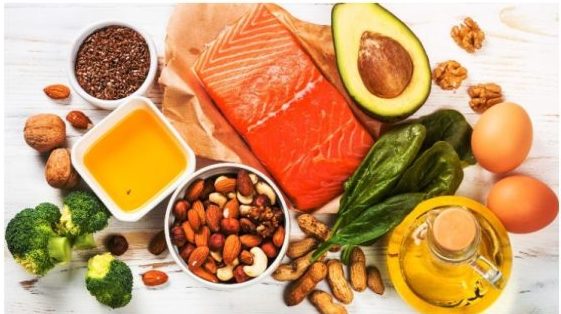Fact Vs. Myth Fat Is Bad For You

Dietary fat is often misunderstood. Eating fat is essential for good health despite common misconceptions. Due to the widespread misconception that all fats are unhealthy, many people innately eliminate fats in their diets. This belief is not at all true, though. Not all fats are made equal, in actuality. Many good fats are essential for our well-being, even though other fats, such as trans fats and excessive saturated fats, can be detrimental and cause health problems. These fats promote vital body processes like hormone synthesis, nutrition absorption, and brain functioning. Making educated dietary decisions and advancing general health depends on knowing the difference between good and unhealthy fats.
Understanding the Different Types of Fat
Saturated Fats
It is predominantly present in animal products, including butter, cheese, and red meat, as well as certain plant oils, such as coconut and palm oil. Coconut oil, in particular, is high in saturated fat and can negatively impact heart health, making it less healthy compared to alternatives like olive oil. The risk of heart disease and stroke is exacerbated by the high levels of LDL (bad) cholesterol in the body that can result from a high consumption of saturated fats. The body needs a certain amount of saturated fat, but to keep your heart healthy, you should only eat these fats occasionally. Butter, cheese, and fatty portions of red meat are among the most prevalent examples of foods that are high in saturated fats.
Trans Fats
These are synthetic fats added to processed foods to enhance texture and prolong shelf life. These fats are frequently present in packaged baked products, fried fast food, and margarine. Trans fats are regarded as the most dangerous kind of fat since they increase the risk of cardiovascular disorders by lowering HDL (good) cholesterol and raising LDL (bad) cholesterol. Trans fats should be avoided at all costs because of their detrimental effects on health. Deep-fried fast food, packaged snack items, and margarine are a few examples of foods that contain trans fats.
Monounsaturated Fats
These are present in avocados, nuts, and plant-based oils. These heart-healthy fats are important for cardiovascular health because they raise HDL (good) cholesterol while lowering LDL (bad) cholesterol. Additionally, monounsaturated fats promote general health by supplying vital fatty acids that aid in controlling inflammation in the body. A balanced diet for heart health can include foods high in monounsaturated fats, such as peanut butter, cashews, avocados, almonds, and olive oil.
Polyunsaturated Fats
It includes key fatty acids, like omega-3 and omega-6 fatty acids, which are critical for cell growth, cognitive function, and general wellness. Polyunsaturated fats provide essential fatty acids, which are crucial for various bodily functions such as hormone regulation, immune function, and nutrient absorption. Foods including walnuts, flaxseeds, fatty seafood, and vegetable oils include these fats. Particularly well-known for their anti-inflammatory qualities and ability to lower the risk of chronic illnesses like heart disease are omega-3 fatty acids. Polyunsaturated fats are essential for preserving cellular integrity and promoting brain health. Flaxseeds, walnuts, salmon, mackerel, and vegetable oils like soybean or sunflower oil are examples of foods high in polyunsaturated fats.
Unhealthy Fats to Avoid
Unhealthy fats, such as saturated and trans fats, can have significant negative effects on our health. Saturated fats, commonly found in foods like red meat, full-fat dairy products, and processed snacks, can raise harmful LDL cholesterol levels, increasing the risk of heart disease. Trans fats, often lurking in processed and fried foods, are even more detrimental, as they not only raise harmful LDL cholesterol but also lower beneficial HDL cholesterol, further escalating the risk of cardiovascular issues.
To maintain optimal health, it’s crucial to limit our intake of these unhealthy fats and opt for healthier alternatives. The American Heart Association recommends keeping saturated fat to less than 6% of your total daily calories and avoiding trans fats altogether.
Here are some examples of unhealthy fats to avoid:
- Processed meats like hot dogs and sausages
- Fried foods such as french fries and fried chicken
- Baked goods like cakes and pastries
- Fried snacks including potato chips and crackers
- Partially hydrogenated oils, such as those found in some margarines and packaged snacks
The Benefits of Healthy Fats
Support Brain Function: Since fat makes up around 60% of the brain, it is essential for cognitive function. Particularly important for brain health are omega-3 fatty acids, which enhance cognitive function, memory, and focus. These good fats are essential for preserving brain cell structure, halting cognitive aging, and promoting mental clarity.
Hormone Production: The synthesis of vital hormones like estrogen and testosterone depends on fats. These hormones control many body processes, such as mood, metabolism, and reproductive health. Healthy fats ensure that the body can manufacture these hormones at sufficient levels, helping maintain general hormonal balance and health.
Nutrient Absorption: The absorption of fat-soluble vitamins, such as A, D, E, and K, depends on fat. These vitamins play a crucial role in various body processes, including immune function, bone health, and skin health. Without adequate fat in the diet, the body may struggle to absorb these vitamins effectively, leading to deficiencies and potential health issues.
Cell Growth and Function: A vital part of cell membranes, fats support the formation and functionality of these membranes. Healthy fats ensure the proper operation of every cell in the body. They help maintain cell integrity, promote cell growth, and facilitate intercellular communication, which is essential for the health of tissues and organs.
By focusing on consuming healthy fats and reducing refined carbs, you can support long-term health, promote weight loss, and enhance immune function, all while avoiding the drawbacks of a low-fat diet that may not provide the nutrients necessary for optimal body function. Extreme low-fat diets can lead to nutritional deficiencies, so a balanced diet that includes healthy fats is essential for proper nutrient absorption and hormonal functions.
The Impact of Fats on Weight and Cholesterol
Fats play a complex role in our weight and cholesterol levels, with both positive and negative effects depending on the type of fat consumed. Healthy fats, such as monounsaturated and polyunsaturated fats, are beneficial for heart health. These fats help lower harmful LDL cholesterol and increase beneficial HDL cholesterol, contributing to a reduced risk of heart disease. Additionally, healthy fats can aid in weight management by providing a sense of fullness and satisfaction, which can help prevent overeating.
To support healthy weight and cholesterol levels, focus on incorporating healthy fats into your diet. Here are some practical tips:
- Choose healthy fats like olive oil and avocado oil for cooking and dressing.
- Incorporate fatty fish such as salmon and sardines into your meals.
- Snack on nuts and seeds like almonds and chia seeds.
- Limit your intake of processed and fried foods.
- Read food labels carefully to avoid partially hydrogenated oils and trans fats.
By prioritizing healthy fats and limiting unhealthy ones, you can maintain a balanced diet that supports both weight management and heart health.
Conclusion
Healthy fats are essential for maintaining good health, supporting hormone production, brain function, and overall well-being. Not all fats are harmful—by focusing on consuming healthy fats in moderation, such as those found in avocados, nuts, olive oil, and fatty fish, you can enhance heart health, promote cognitive function, and provide your body with the nutrients it needs for healthy growth and maintenance. Including healthy fats in your diet, while reducing unhealthy trans and saturated fats, can aid in weight loss and improve immune function. Additionally, cutting back on refined carbs helps ensure balanced nutrition, supporting long-term health and vitality.
The post Fact VS. Myth Fat is BAD for you appeared first on Dumb Little Man.


